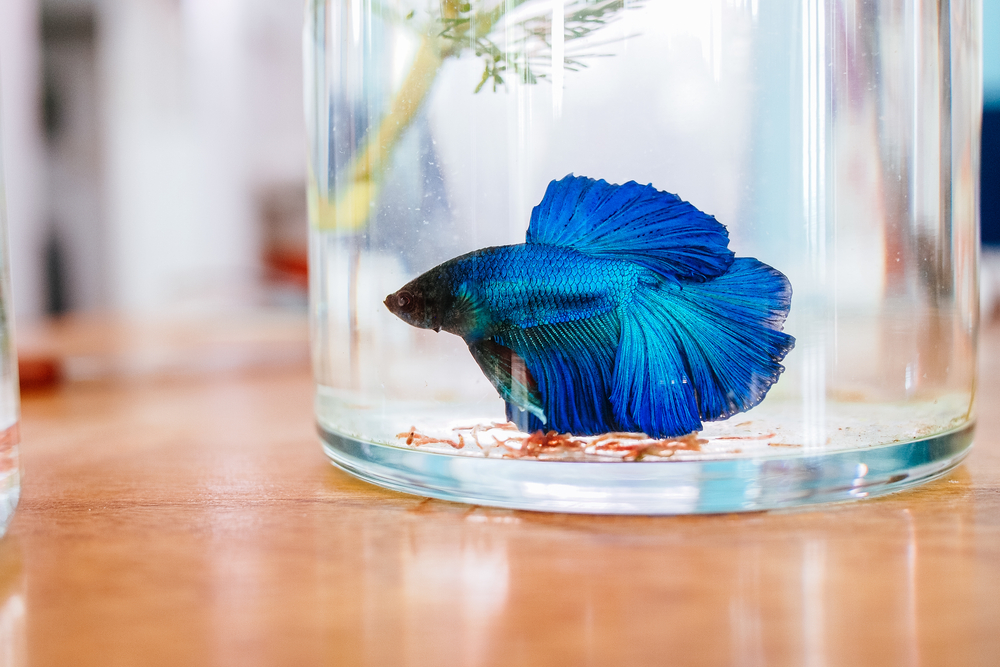There are many aspects to consider when setting up an aquarium for a betta fish. Water quality is one of the more important things, as suitable water parameters provide a comfortable and thriving environment for your bettas. While there are many water options for your bettas, today’s topic is all about tap water. Can betta fish live in tap water?
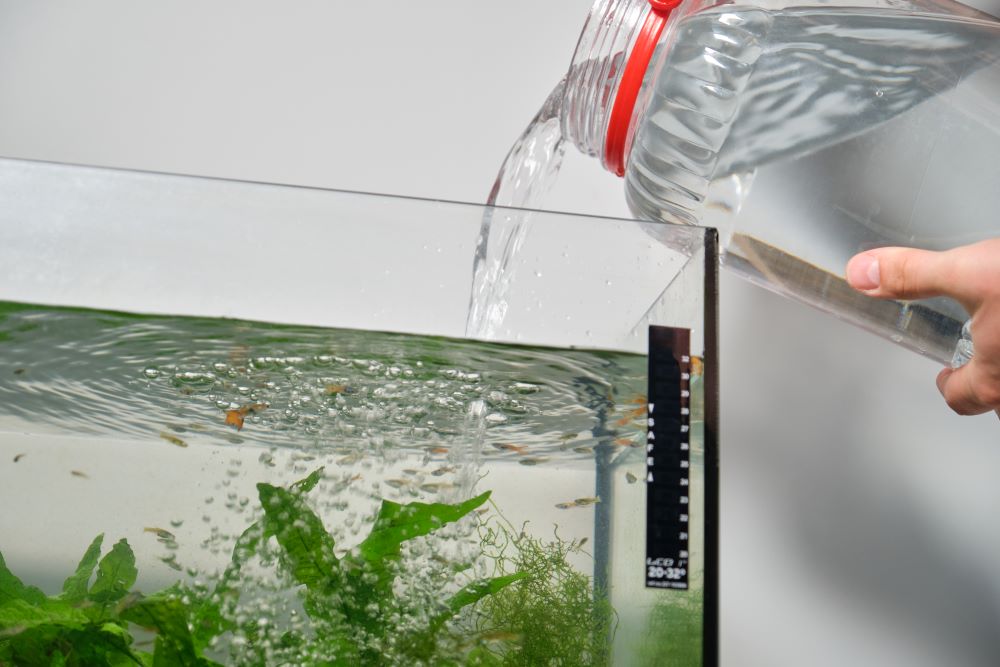
Well, tap water can be a suitable environment for betta fish, provided it undergoes proper treatment beforehand. Although municipal water supplies are treated to make them safe for human consumption, the chemicals used, including chlorine and chloramines, are toxic to bettas.
But what else do you need to know about betta fish living in tap water? Let’s jump right into the facts.
Contents
Understanding Water Basics for Betta Fish
Understanding water parameters is an essential step to keeping your betta fish healthy. You must know the right water conditions and how fluctuations can affect your fish.
Check out these other top picks:
- Do Betta Fish Hibernate?
- Betta Fish Laying on Bottom of Tank
- How Much to Feed Betta Fish for Optimal Health and Longevity
The Role of pH in Betta Fish Health
pH levels are an important aspect of your aquarium’s water quality. With bettas, you want a slightly acidic pH, typically between 6 and 7, as this range simulates their natural habitat and promotes well-being. Sudden fluctuations can stress these creatures, so test your water regularly to stabilize the pH.
Importance of Water Temperature for Betta Fish
Regarding water temperature, betta fish thrive in warmer waters between 76°F and 82°F. This temperature range supports their metabolism and enhances their well-being. Temperatures outside this range pose several health risks, including negatively affecting their immune system and, over time, leading to severe health complications.
Proper Water Conditioning Techniques
When setting up an aquarium for your betta fish, you want to get the water chemistry right. In this case, you must condition the tap water properly, as it contains fish-toxic chemicals.
Dechlorinating Tap Water
The chlorine and chloramines in tap water can harm betta fish. To make it safe, use a water conditioner that quickly neutralizes these chemicals. Just a few drops per gallon of water usually does the trick.
- Dosage: Read the label carefully to apply the correct amount based on my aquarium size.
- Application: The conditioner is added directly to the water before I introduce my betta fish to ensure a chlorine-free environment.
Adjusting Water Hardness with Minerals
Water hardness depends on the minerals dissolved in it. You should test tap water for hardness to see if it suits your bettas. Depending on the result, you may add essential minerals to soften the water or remove them to make it harder.
- Raising hardness: Carefully add minerals such as calcium or magnesium to increase the water hardness.
- Lowering hardness: Opt for natural solutions or ion exchange resins that selectively remove unwanted minerals to decrease hardness.
Choosing the Right Water for Your Betta
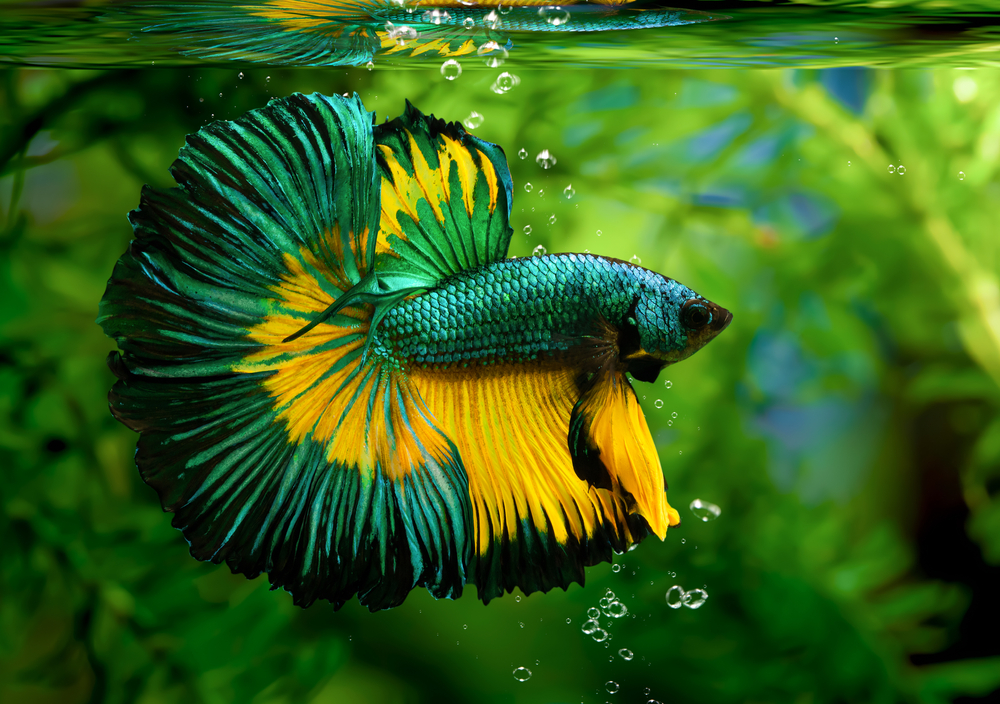
We’ve highlighted the importance of getting the water conditions right for your betta fish tank. However, there are several water options, and each affects your betta’s health differently.
The Debate: Tap vs. Bottled vs. Distilled vs. Well vs. Spring Water
Tap Water: Tap water often contains chlorine and chloramines, which can harm betta fish. Still, you can make it suitable using a water conditioner. Then, you want to let it sit for a day to acclimate to the right temperature and remove residual gases.
Bottled Water: Bottled water is typically free of chlorine, but it may still contain other minerals and chemicals that aren’t ideal for betta fish. If you opt for bottled water, check for any other possibly dangerous elements and strive for a pH of about 7.
Distilled Water: Distilled water doesn’t contain contaminants and heavy metals, but it lacks the necessary aquarium minerals. Still, it’s great for diluting overly hard tap water to achieve the right hardness level.
Well Water: Using well water can be risky due to potential pollutants and variable pH levels. So, before considering it, test for heavy metals and nitrates to ensure its safety.
Spring Water: Spring water is a natural choice for betta fish, and it often has a balanced pH and beneficial minerals. Still, it’s very important to test for contaminants before use.
Overall, you always want to inspect the water chemistry regardless of the source because a conducive environment means your betta fish stays healthy.
Monitoring and Balancing Water Parameters
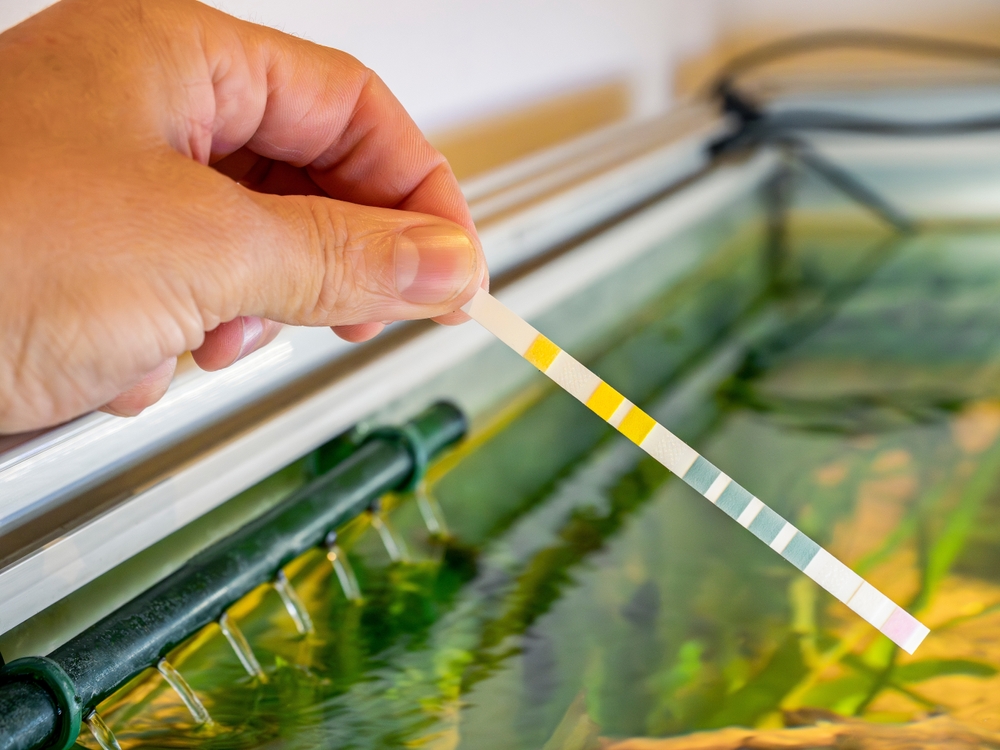
You want to prioritize consistently monitoring and balancing your aquarium’s water parameters. This ensures the water is free of harmful chemicals and within the safe ranges, bettas need to thrive.
Essential Water Tests for Betta Health
Conducting regular water tests is necessary for ensuring your betta’s health. As such, you want to use a water testing kit to check the following parameters:
- pH Level: Betta fish prefer a pH level between a range of 6 and 7. You can perform a pH test weekly with test strips or a liquid test kit.
- Ammonia: Test for ammonia frequently, as it can accumulate quickly and is toxic to Betta fish, even in small amounts.
- Nitrites and Nitrates: These are part of the nitrogen cycle, and you can test for them alongside ammonia. Their levels should be kept low through regular water changes and tank maintenance.
Guidelines for Water Parameters:
| Parameter | Ideal Range |
|---|---|
| pH | 6.5 – 7.5 |
| Ammonia | 0 ppm |
| Nitrites | 0 ppm |
| Nitrates | Less than 20 ppm |
Managing Ammonia, Nitrite, and Nitrate Levels
High levels of ammonia, nitrites, and nitrates are toxic for bettas. To safeguard your fish, here’s how to handle each one:
- Ammonia: Once detected, quickly change the water and check for overfeeding or decaying organic matter. If necessary, you should use an ammonia neutralizer.
- Nitrites: A spike in nitrites indicates a maturing nitrogen cycle. To keep nitrite levels low, carry out frequent water changes.
- Nitrates: While less toxic, nitrates can also affect betta’s health. To prevent their buildup, clean your tank regularly. You can also add live plants to your tank, as they feed on nitrates.
Preventing Contaminants and Toxins
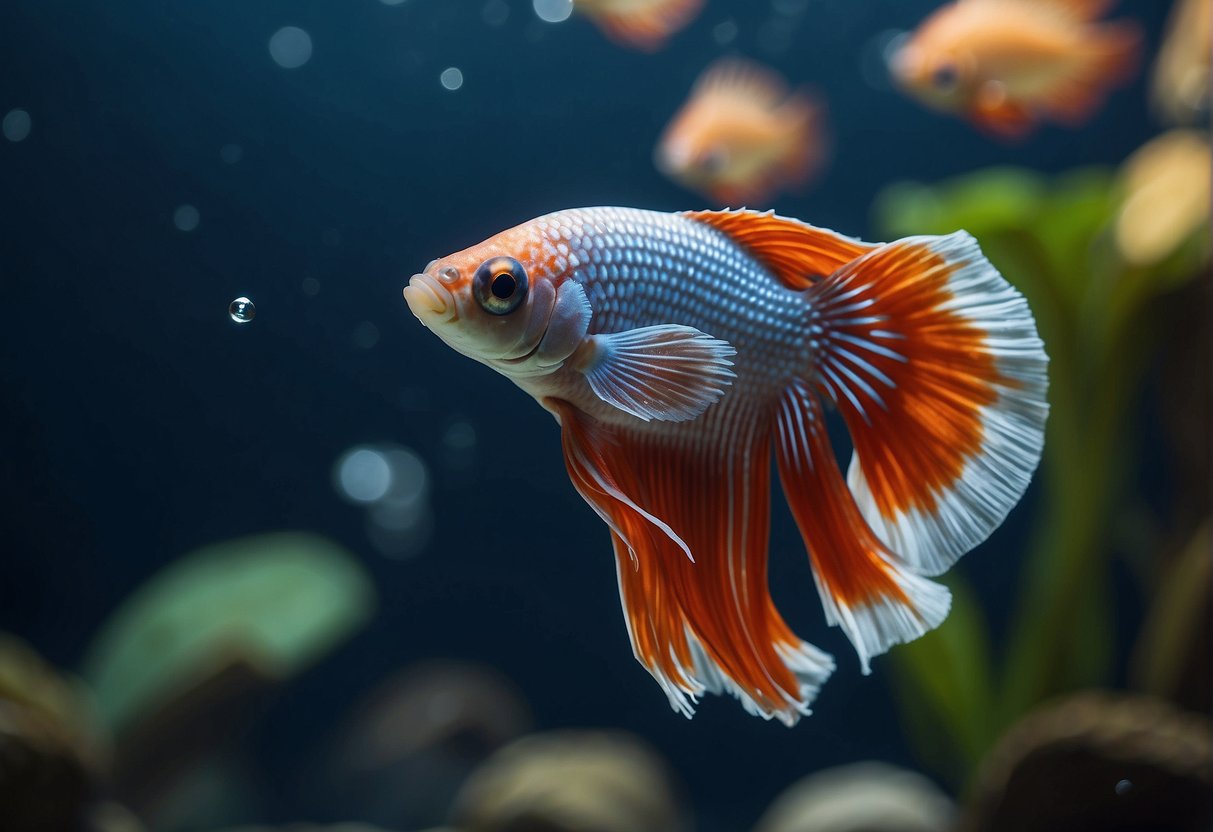
You want to increase the safety of using tap water for your bettas by preventing the accumulation of potential contaminants. We’ve outlined some key focus areas to consider.
Understanding Tap Water Contaminants
As stated earlier, tap water contains various minerals and contaminants that can harm betta fish. Common toxins in tap water include chlorine and chloramines, which are added to municipal water supplies to disinfect them but are toxic to fish.
Heavy metals like copper and lead can leach from old pipes, posing a serious risk to aquatic life. You also have to worry about pesticide poisoning, as even trace amounts can become toxic to small, sensitive creatures like betta fish.
Safeguarding Against Heavy Metals and Pesticides
Water conditioning is a great way to prevent heavy metals and pesticide poisoning. Adding a water conditioner to your tank effectively neutralizes toxic substances such as chlorine, chloramines, copper, and lead.
However, select a water conditioner specifically designed to handle heavy metals and detoxify chloramines. If you suspect high levels of toxins in your tap water, consider using pre-filtered or reverse osmosis water as an alternative to tap water.
Best Practices for Betta Fish Care
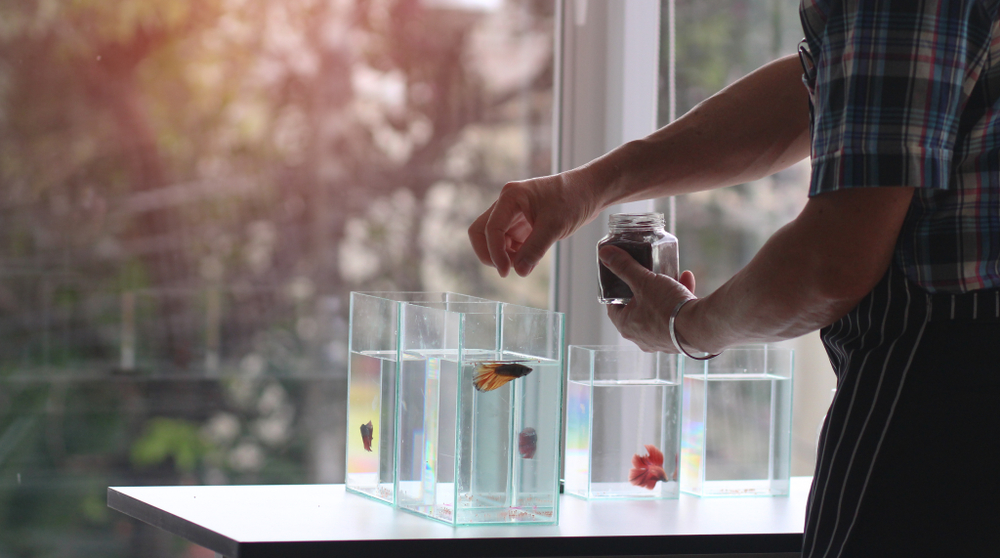
Providing ideal water conditions and a stress-free habitat are essential for their health and well-being. To guarantee that, you must be particular about your fish keeling practices. To prevent stress, you want to acclimate your betta fish to new tap water.
You can slowly adjust the betta to the new water parameters, particularly the water temperature, which should be maintained between 76-80 degrees Fahrenheit (23-26 degrees Celsius). Start by placing your betta in a separate container with the original tank water and slowly mix in small amounts of the new water for an hour.
This careful process reduces stress and prevents shock, which could harm their health. You might also consider using a stress coat additive to shield them from potential tap water contaminants and help them heal from stress-related injuries.
Conclusion
The question of whether your betta fish can survive in tap water might be a bit tricky. While they may survive in untreated tap water, surviving alone won’t guarantee their best health and well-being. For them to thrive, you need to be proactive, pay close attention to detail, and be thoroughly aware of their unique needs.
Remember that it is essential to clean tap water to get rid of contaminants like chlorine and heavy metals so that you can provide your betta buddies with the best possible environment. So, using a reliable water conditioner is very important. By doing these correctly and eliminating pollutants, we can create a secure and nurturing environment where our bettas can flourish.
Frequently Asked Questions
In this section, we’ll look at some of the most commonly asked questions about betta fish living in tap water.
How should tap water be treated before adding a betta fish to it?
To prepare tap water for betta fish, using a water conditioner that neutralizes chlorine, chloramines, and other harmful chemicals is vital. This helps balance the pH and makes the water habitable for betta fish.
What is the recommended duration for conditioning tap water before placing my betta fish in it?
After treating tap water with conditioner, it’s best practice to let the water sit for at least 24 hours before introducing the betta to ensure all harmful substances have dissipated and the water reaches room temperature.
Is a water conditioner necessary for a betta fish’s health in tap water?
Indeed, a water conditioner is essential for a betta fish’s well-being in tap water, as it removes toxic elements and prevents gill destruction and other potential health issues.
What are the potential risks of using untreated tap water for betta fish?
Untreated tap water can expose betta fish to several hazards, such as chlorine and heavy metals, that can lead to stress, gill damage, or even death due to its potential contaminants and temperature inconsistencies.
Can I use bottled water as an alternative to tap water for my betta fish?
While bottled water is an option, it’s not always necessary or cost-effective. If you decide to use it, spring water is generally preferable because it has minerals beneficial for betta fish, but make sure it doesn’t contain additives that could harm them.
What signs should I look for to ensure tap water does not adversely affect my betta fish?
Keep an eye on signs of distress, such as lethargy, lack of appetite, faded colors, or erratic swimming. These behaviors might indicate that tap water quality negatively impacts your betta fish, and prompt action will be needed to correct the water conditions.

Ian Sterling, founder of Fishlab.com, began his aquarium journey over 30 years ago, driven by a deep fascination for fish and their diverse personalities. His website, Fishlab.com, is dedicated to making fishkeeping accessible and enjoyable, offering beginner-friendly guidance, expert insights, and a community for aquarists to connect and share experiences.


